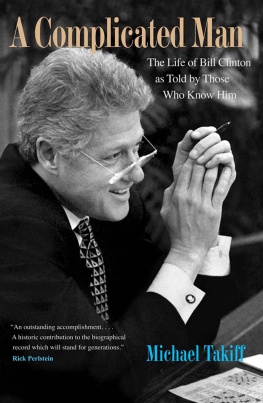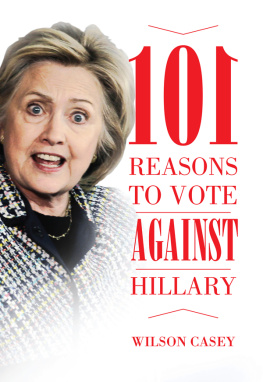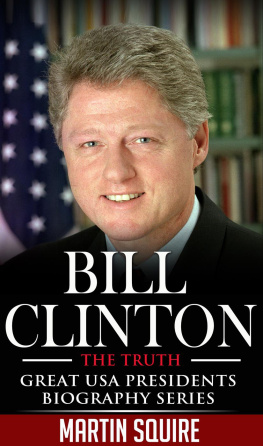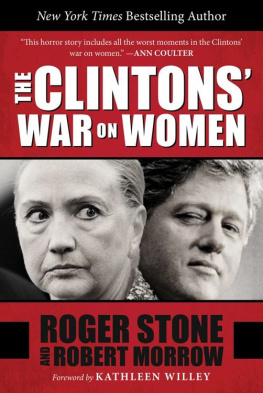A Complicated Man
_______________________
The Life of Bill Clinton
as Told by Those
Who Know Him
Michael Takiff
Yale
UNIVERSITY PRESS
New Haven and London
Published with assistance from the Kingsley Trust Association Publication Fund established by the Scroll and Key Society of Yale College.
Copyright 2010 by Michael Takiff. All rights reserved. This book may not be reproduced, in whole or in part, including illustrations, in any form (beyond that copying permitted by Sections 107 and 108 of the U.S. Copyright Law and except by reviewers for the public press), without written permission from the publishers.
Yale University Press books may be purchased in quantity for educational, business, or promotional use. For information, please e-mail (U.K. office).
Printed in the United States of America by The Maple-Vail Book Mfg. Group.
Library of Congress Cataloging-in-Publication Data
Takiff, Michael, 1955
A complicated man : the life of Bill Clinton as told by those who know him / Michael Takiff.
p. cm.
Includes bibliographical references and index.
ISBN 978-0-300-16888-4 (cloth : alk. paper)
1. Clinton, Bill, 1946. 2. PresidentsUnited StatesBiography. 3. United States-Politics and government19932001. 4. GovernorsArkansasBiography. 5. Ex-presidentsUnited StatesBiography. 6. Clinton, Bill, 1946 Friends and associates. 7. InterviewsUnited States. 8. ArkansasBiography. I. Title.
E886.T35 2010
973.929092dc22 [B] 2010019584
A catalogue record for this book is available from the British Library. This paper meets the requirements of ANSI/NISO Z39.48-1992 (Permanence of Paper).
10 9 8 7 6 5 4 3 2 1
For Amy
_______________________
Authors Note
Throughout the book, I refer to President Clinton by his first name, Bill.
To refer to him as Clinton, although a more usual practice in works of history, seemed impersonal. It seemed to create distance between the subject and the reader, when the goal of the book is intimacy.
The first name is used in order to help the reader follow the life and work of an individual, not an officeholder.
No disrespect is intended toward a former president of the United States.
Introduction
___________________
An Endless Argument
A remarkable talent. A gifted leader. A genius.
An overgrown teenager. A liar. A fool.
A consummate public servant.
A consummate narcissist.
A liberal.
A conservative.
A liberal in conservatives clothing.
A conservative in liberals clothing.
A decent man with flaws.
A flawed man with no decency.
Uhhhh ... Will the real Bill Clinton please stand up?
Waitis there a real Bill Clinton? Are there many real Bill Clintons?
Who is Bill Clinton?
Bill Clinton did not come to the White House empty-handed: Among the assets he brought were a dazzling intellect, unmatched people skills, a passion for good governance, an insatiable curiosity. He had been a successful and long-serving governor of Arkansas. His upbringing had left him with the ability to understand and identify with the problems of ordinary people. His campaign had succeeded in painting his chief opponent, the incumbent president, George H. W. Bush, as the candidate of yesterday and the powerful, and himself as the candidate of tomorrow and the middle class. He advertised a program of investment in the nations people and its future, and a determination to bring about what presidents for decades had tried but failed to accomplish: universal health insurance.
A substantial array of advantages with which to start his presidencybut his presidency did not start as planned. The outgoing administrations last-minute revisions of estimated budget deficits spurred a change in economic focus, from investment in knowledge and infrastructure to reduction of federal red ink. He made costly misstepshe was outmaneuvered and embarrassed on gays in the military; he had trouble staffing his Justice Department. Established Washington treated him with disdain.
Initial moves in foreign policy were equally disappointing. He got the cold shoulder from China for tying trade relations to human rights. Two complex and perilous situations were not of his makinghis predecessor had involved America in Somalia and dodged involvement in Bosnia; nonetheless, Bill did not handle those problems well. He slept while Rwanda burned. And for his first year and a half in office, he ran a White House that reflected, and was hobbled by, his own lack of intellectual and managerial discipline.
Still, his opening months in office saw big achievements. He pushed through a budget that cut spending and raised taxes (slightly) on the well-to-do, setting in motion a process that would lead to a budget surplus by the end of his tenure in office. And whether or not his fiscal responsibility was the cause, the economy boomed in the 1990s as never before. Against bitter opposition from his friends on the left of his party, he won the assent of Congress to the North American Free Trade Agreement. He defied the National Rifle Association to enact two major pieces of gun-control legislation.
In foreign affairs he laid the groundwork for a fruitful relationship with Boris Yeltsins Russia and a peaceful resolution to the Troubles of Northern Ireland. With help from Jimmy Carter and without a shot being fired, he reinstalled the democratically elected leader of Haiti.
Yet by the time hed been president for nineteen months, he had met with his most heartbreaking failure: health care reform. He chose his wife to lead the enormous undertaking; she recruited other brilliant minds to team with her own; together, they came up with a plan. The effort fell apart, because the plan was too complex and not well explained, or because she had not worked closely enough with Congress, or because the forces opposing it were too well funded and too willing to scare the public, or because Bill had taken hold of too many issues at onceor just because overhauling our nations health care system was at that time impossible.
The failures of the first two yearsand one of the successes, gun control exploited by a savvy opposition led by the cunning Newt Gingrich, produced a stunning rebuke in the midterm elections of 1994. From then to the end of his presidency, Bill would have to work with a Congress controlled, in both houses, by the opposition party. Momentarily shaken by the slapdown, Bill came back. He trimmed his sails, playing small ball with initiatives like school uniforms and V-chips. He responded to a terrorist attack in Oklahoma City with rare humanity and warmth. He led NATO in finally standing up to ethnic cleansing in Bosnia.
And he picked a fight with Gingrich, now speaker of the House, over the upcoming budget. Cleverly, and with help from the unappealing and overconfident Gingrich, he succeeded in casting the speaker as the face of a heartless assault on middle Americas way of life and himself as that way of lifes defender. Seeking reelection, he tied Gingrich around the neck of the Republican nominee, Bob Dole, and barely broke a sweat on the way to a comfortable victory in November 1996, just two years after his political obituary had been written.
He was set up for a successful second term. He was prepared to spend political capital to take on an issue long considered the most perilous in Washington, entitlement reform. But a year into that term, the world learned of his affair with an intern young enough to be his daughter.
There is always the sex. During the time I was working on this book, whenever I would meet someone new and would answer the So what do you do? question, that persons follow-up to me would always be, So, what did he see in Monica anyway? Or Whos he sleeping with now? Or Is he really a sex addict? Or How could he have been so stupid? Never Gee, what a bang-up job he did on the economy. Or What an accomplishment it was to restore fiscal sanity to the government. Or He sure did stick it to Slobodan Miloevi. Or even Man, he really blew it on health care or That SOB screwed the middle class on NAFTA.







